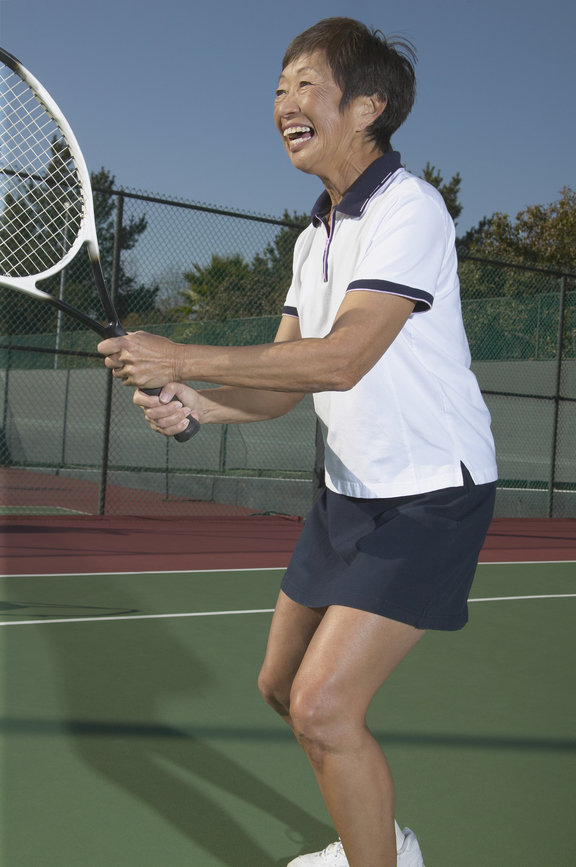Demand to grow for ageing-related musculoskeletal injuries
NTU and Changi General Hospital will launch a new Graduate Diploma in Sports Medicine, which will also look into sports medicine services.
 With an ageing population and as more people of all ages in Singapore take up exercise to stay healthy, the demand for sports medicine services and ageing-related musculoskeletal injuries are set to rise, but such expertise is only available at a small group of specialist clinics. To equip medical practitioners, including general practitioners, with the knowledge and skills to meet the growing demand for medical expertise in these areas, Nanyang Technological University, Singapore (NTU Singapore) and Changi General Hospital (CGH) will launch a new Graduate Diploma in Sports Medicine. Prior to this new programme, such courses were only available in Australia, the UK and US.
With an ageing population and as more people of all ages in Singapore take up exercise to stay healthy, the demand for sports medicine services and ageing-related musculoskeletal injuries are set to rise, but such expertise is only available at a small group of specialist clinics. To equip medical practitioners, including general practitioners, with the knowledge and skills to meet the growing demand for medical expertise in these areas, Nanyang Technological University, Singapore (NTU Singapore) and Changi General Hospital (CGH) will launch a new Graduate Diploma in Sports Medicine. Prior to this new programme, such courses were only available in Australia, the UK and US.
The programme will enable participants to better prevent and treat the growing number of musculoskeletal and sports-related injuries and ailments in a population which is rapidly ageing but staying active longer. It will be run by the Lee Kong Chian School of Medicine (LKCMedicine), a joint medical school by NTU Singapore and Imperial College London. The first intake of students into this graduate diploma programme will be in late July this year.
Besides injury management and prevention, and exercise prescription for the elderly and patients with chronic medical conditions such as diabetes and hypertension, the one-year diploma programme, which will be conducted on a part-time basis, caters to primary care doctors and specialists who wish to further their knowledge in areas such as sports nutrition, biomechanics and physiology, as well as to military doctors, the bulk of whose cases are musculoskeletal in nature.
The introduction of the new postgraduate diploma, the first of its kind in Singapore and Asia, is timely as there is limited medical expertise in the prevention and non-surgical treatment of sports injuries and musculoskeletal conditions in athletes and the general population, including the elderly. A survey conducted by LKCMedicine here among general practitioners and family physicians in 2015 also found that 92 percent of respondents indicated interest in pursuing such a diploma.
Professor Kam Chan Hin, NTU Deputy Provost (Education), said, “Our graduate diploma in sports medicine aims to impart important knowledge to doctors at the primary care level, where most sport injuries can be effectively managed, and to refer more complex cases to the sports medicine specialist clinics.
“Furthermore, as Singapore’s population ages, graduates of this programme will also be well placed to care for the growing number of elderly patients who are at a higher risk of musculoskeletal injuries, such as chronic back pain, sprains, arthritis and tendonitis.”
Adjunct Associate Professor Benedict Tan, chief of Sports Medicine at CGH and chairman of the Graduate Diploma Advisory Board, who is also a former Olympic Games sailor, said, “Sports injuries see better outcomes when given prompt attention, and that is why primary care doctors need to be better equipped to manage these injuries.”
With one of the world’s most rapidly ageing populations – the number of Singaporeans aged 65 and above is projected to double from 440,000 in 2015 to 900,000 by 2030 – ageing-related injuries and ailments in Singapore are likely to rise. Sports-related injuries are also expected to increase as more people adopt exercise regimens to lead a healthier lifestyle. The 2014 Sports Index by Sport Singapore showed that 38 percent of respondents engaged in sports activities at least thrice a week, compared to just 16 percent in 2001.
The Graduate Diploma in Sports Medicine will leverage CGH’s expertise in sports medicine, in combination with LKCMedicine’s strengths in exercise science and physiology and the state-of-the-art facilities at its Clinical Sciences Building at the School’s new Novena campus.
Part of the diploma programme will be conducted online to help students better juggle their work commitments as medical practitioners. The online lectures will be complemented with workshops and clinical attachments at sports medicine clinics in Singapore, culminating in a summary training and final exam. There will also be opportunities to consult experts with at least 10 years’ experience. These include sports physicians, surgeons, musculoskeletal radiologists, sport scientists, physiotherapists and dietitians, many of whom have worked in tertiary healthcare institutions, and with elite athletes at the Singapore Sports Institute and during major international events such as the Olympic and Asian Games.
Practitioners who complete the qualification, which has been endorsed by the Singapore Medical Council, can display the credentials and provide medical support for sports programmes and events.

0 Comments